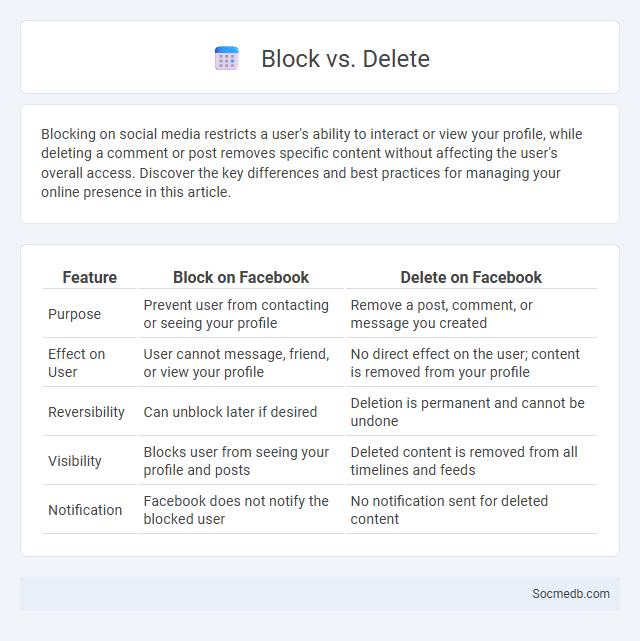
Photo illustration: Block vs Delete
Blocking on social media restricts a user's ability to interact or view your profile, while deleting a comment or post removes specific content without affecting the user's overall access. Discover the key differences and best practices for managing your online presence in this article.
Table of Comparison
| Feature | Block on Facebook | Delete on Facebook |
|---|---|---|
| Purpose | Prevent user from contacting or seeing your profile | Remove a post, comment, or message you created |
| Effect on User | User cannot message, friend, or view your profile | No direct effect on the user; content is removed from your profile |
| Reversibility | Can unblock later if desired | Deletion is permanent and cannot be undone |
| Visibility | Blocks user from seeing your profile and posts | Deleted content is removed from all timelines and feeds |
| Notification | Facebook does not notify the blocked user | No notification sent for deleted content |
Introduction to Social Media Connection Controls
Social media connection controls manage privacy and interaction settings to enhance user security and personalize online experiences. These controls include options to restrict friend requests, block unwanted contacts, and customize visibility of posts, ensuring users maintain control over their social network environment. Effective use of connection controls reduces spam, prevents harassment, and fosters safer social media engagement.
What Does Blocking Mean?
Blocking on social media means restricting another user's ability to interact with your profile, view your posts, or send you messages. You prevent unwanted communication or content visibility, ensuring greater control over your online privacy and safety. This action creates a digital barrier that protects your personal space from harassment or spam.
The Implications of Deleting Contacts
Deleting contacts on social media significantly impacts network dynamics, reducing online visibility and limiting information flow between users. This action can alter social graph structures, affecting content reach, personalized algorithmic suggestions, and engagement metrics such as likes and shares. User privacy and emotional wellbeing are also influenced, as removing connections may reduce exposure to unwanted interactions but can lead to social isolation or perceived social rejection.
Unfriending: What Happens When You Remove a Connection
Unfriending on social media immediately revokes your connection with the other user, removing their access to your private posts and updates. Your profile becomes less visible to them, and they typically receive no notification about the removal to minimize conflict. Understanding how unfriending affects your digital presence helps you manage Your online relationships and privacy effectively.
Blocking vs Deleting: Key Differences
Blocking on social media restricts interactions by preventing specific users from viewing your profile, sending messages, or engaging with your content, effectively creating a barrier without removing any existing posts or information. Deleting, however, involves removing posts, comments, or even an entire account, permanently erasing content from the platform and limiting its visibility to others. Understanding these differences is crucial for managing privacy, controlling audience engagement, and maintaining online boundaries efficiently.
Block, Delete, or Unfriend: When and Why
You should block someone on social media when their interactions are harmful or invasive, ensuring your online safety and privacy. Deleting a message or comment helps manage unwanted content without severing connections, maintaining control over your digital space. Unfriending is appropriate when you want to remove someone from your network entirely due to incompatible values or lack of meaningful interaction.
Privacy and Security: Which Option Is Best?
When evaluating social media platforms for privacy and security, end-to-end encrypted messaging apps like Signal and Telegram offer superior protection against data breaches and unauthorized access. Facebook and Instagram, despite their popularity, often face criticism for data mining and weaker privacy controls, making them less ideal for users prioritizing confidentiality. Users should consider platforms implementing robust encryption standards, transparent data policies, and frequent security audits to ensure optimal privacy and user safety.
Emotional Impact of Blocking, Deleting, and Unfriending
Blocking, deleting, and unfriending on social media can trigger significant emotional responses such as feelings of rejection, anxiety, and lowered self-esteem, as these actions often symbolize social exclusion. The immediate emotional impact varies depending on the strength of the relationship and individual sensitivity, with some users experiencing relief from toxic interactions while others face distress over perceived social loss. Understanding the psychological effects of these digital disconnections is essential for promoting healthier online communication and emotional well-being.
Platform Policies: How Each Action Works on Major Networks
Platform policies on major social media networks like Facebook, Instagram, Twitter, and TikTok govern user actions such as posting, commenting, sharing, and reporting content, with each platform employing specific algorithms and moderation rules to enforce community standards and detect violations. For instance, Facebook's algorithm prioritizes content based on user engagement and relevance, while Twitter uses automated systems combined with human review to manage misinformation and harassment. Understanding these policies helps users navigate content creation and interaction while ensuring compliance with rules designed to maintain a safe and respectful online environment.
Making the Right Choice for Your Digital Relationships
Choosing the right social media platforms is crucial for fostering meaningful digital relationships and ensuring positive interactions. Focus on platforms that align with your personal values and communication style to maximize genuine engagement and trust. Prioritize privacy settings and community guidelines to protect your digital well-being and cultivate a supportive online environment.
 socmedb.com
socmedb.com